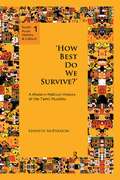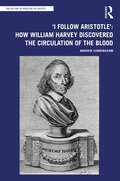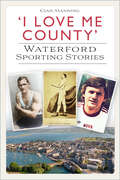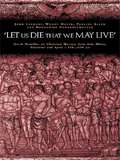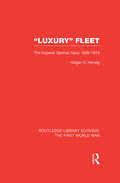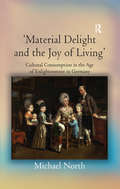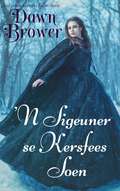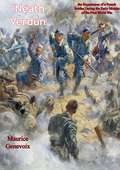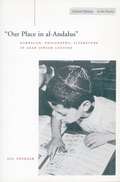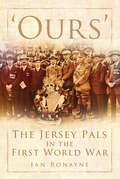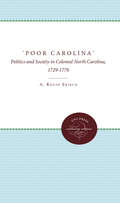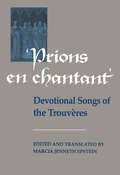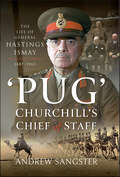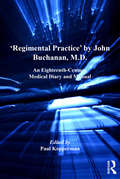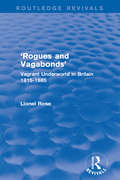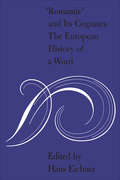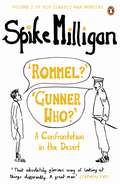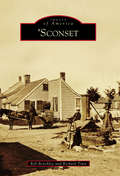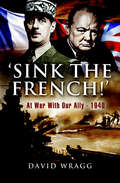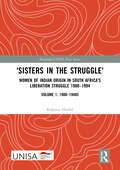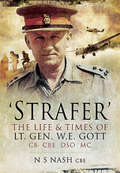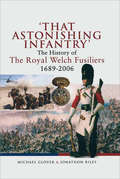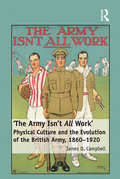- Table View
- List View
'How Best Do We Survive?': A Modern Political History of the Tamil Muslims (South Asian History and Culture)
by Kenneth McPhersonThis book traces the social and political history of the Muslims of south India from the later nineteenth century to Independence in 1947, and the contours that followed. It describes a community in search of political survival amidst an ever-changing climate, and the fluctuating fortunes it had in dealing with the rise of Indian nationalism, the local political nuances of that rise, and its own changing position as part of the wider Muslim community in India. The book argues that Partition and the foundation of Pakistan in 1947 were neither the goal nor the necessarily inescapable result of the growth of communal politics and sentiment, and analyses the post-1947 constructions of events leading to Partition. Neither the fact of Muslim communalism per se before 1947 nor the existence of separate Muslim electorates provide an explanation for Pakistan. The book advances the theory that micro-level studies of the operation of the former, and the defence of the latter, in British India can lead to a better understanding of the origins of communalism. The book makes an important contribution to understanding and dealing with the complexities of communalism — be it Hindu, Muslim or Christian — and its often tragic consequences.
'I Follow Aristotle': How William Harvey Discovered the Circulation of the Blood (The History of Medicine in Context)
by Andrew CunninghamThis book presents a new interpretation of how and why the discovery of the circulation of the blood in animals was made. It has long been known that the English physician William Harvey (1578–1657) was a follower of Aristotle, but his most strikingly ‘modern’ and original discovery – of the circulation of the blood – resulted from Harvey following Aristotle’s ancient programme of investigation into animals. This is a new reading of the most important discovery ever made in anatomy by one man and produces not only a radical re-reading of Harvey as anatomist, but also of Aristotle and his investigations of animals.
'I Love Me County': Waterford Sporting Stories
by Cian ManningWaterford, the Gentle County, can boast a proud sporting tradition that is as long as it is unusual. Ireland’s oldest city has witnessed many trends, from blood sports like bull-baiting in Ballybricken to roller hockey at the Olympia Ballroom. But the towns and villages of County Waterford were not to be overshadowed, producing notable sports people such as basketballers and boxers.In ‘I Love Me County’, learn about everyone from camogie pioneers to World Champions, as this collection of stories records the lives, loves and losses of some of Waterford’s forgotten sporting heroes, demonstrating the importance of sport and leisure in the history of the county.
'Infosys' Narayana Murthy
by N. ChokkanThis book tells the biography of N. R. Narayana Murthy , the Founder of Infosys Technologies Limited, (a global software consulting company) and how by simple living and great thinking he was able to tread the path of success. It records as well the role of his wife Sudha Murthy who stood by him in all his endeavor.
'Lector Ludens'
by Michael SchamIn sixteenth- and seventeenth-century Spain, debating the acceptability of games and recreation was serious business. With Lector Ludens, Michael Scham uses Cervantes's Don Quijote and Novelas ejemplares as the basis for a wide-ranging exploration of early modern Spanish views on recreations ranging from cards and dice to hunting, attending the theater, and reading fiction.Shifting fluidly between modern theories of play, little-known Spanish treatises on leisure and games, and the evidence in Cervantes's own works, Scham illuminates Cervantes's intense fascination with games, play, and leisure, as well as the tensions in early modern Spain between the stern moralizing of the Counter-Reformation and the playfulness of Renaissance humanism.
'Let us die that we may live': Greek homilies on Christian Martyrs from Asia Minor, Palestine and Syria c.350-c.450 AD
by Pauline Allen Wendy Mayer Boudewijn Dehandschutter Johan LeemansThis book presents fresh, lively translations of fourteen such homilies, the majority for the first time in English. The homilies were delivered in some of the main cities of the Greek East of the later Roman Empire, by well-known figures such as Basil of Caesarea, Gregory of Nyssa and John Chrysostom, as well as the equally gifted preachers Asterius of Amasea and Hesychius of Jerusalem.'Let us die that we may live' offers an approachable, surprising, and not always reverent insight into the life of the Early Church. It reveals the full importance of the martyr homily in terms of style, treatment of its subject, and social and liturgical issues, in a way that will be useful across disciplines such as theology, classical studies, and religion.
'Luxury' Fleet: The Imperial German Navy 1888-1918 (Routledge Library Editions: The First World War)
by Holger H. HerwigOriginally published in 1980 ‘Luxury’ Fleet (the phrase was Winston Churchill’s) was the first history of the Imperial German navy from 1888 to 1918. After tracing the historical background to German naval ambitions, the first two sections of the book analyse Admiral Tirpitz’s programme of building a battle fleet strong enough to engage the Royal Navy in the North Sea. The author shows the fleet in its European setting and describes the warships and the attitudes of the officer corps and seamen. The final section of the book discusses the tactical deployment of the German fleet during the First World War, both in home waters and overseas; and it weighs the balance between those who supported fleet actions in preference to those who favoured cruiser and submarine warfare.
'Material Delight and the Joy of Living': Cultural Consumption in the Age of Enlightenment in Germany
by Michael NorthEighteenth-century Europe witnessed a commercialization of culture as it became less courtly and more urban. The marketing of culture became separate from the production of culture. New cultural entrepreneurs entered the stage: the impresario, the publisher, the book seller, the art dealer, the auction house, and the reading society served as middlemen between producers and consumers of culture, and constituted at the same time the beginning of a cultural service sector. Cultural consumption also played a substantial role in creating social identity. One could demonstrate social status by attending an auction, watching a play, or listening to a concert. Moreover, and eventually more significant, one could demonstrate connoisseurship and taste, which became important indicators of social standing. The centres of cultural exchange and consumption were initially the great cities of Europe. In the course of the eighteenth century, however, cultural consumption penetrated much deeper, for example into the numerous residential and university towns in Germany, where a growing number of functional elites and burghers met in coffee houses and reading societies, attended the theatre and opera, and performed orchestral and chamber music together. Journals, novels and letters were also crucial in forming consumer culture in provincial Germany: as the German states were remote from the cultural life of England and France, the material reality of London and Paris often passed as a literary construction to Germany. It is against this background, and stimulated by the research of John Brewer on England, that the book systematically explores this field for the first time in regard to the Continent, and especially to eighteenth-century Germany. Michael North focuses, chapter by chapter, on the new forms of entertainment (concerts, theatre, opera, reading societies, travelling) on the one hand and on the new material culture (fashion, gardens, country houses, furniture) on the other. At the centre of the discussion is the reception of English culture on the Continent, and the competition between English and French fashions in the homes of German elites and burghers attracts special attention. The book closes with an investigation of the role of cultural consumption for identity formation, demonstrating the integration of Germany into a European cultural identity during the eighteenth century.
'N Sigeuner se Kersfees Soen
by Dawn BrowerLulia Vasile is die dogter van 'n Romaanse prinses en 'n Graaf se tweede seun. Sy het grootgeword met rolle in 'n reisende teater, optreedes by graafskoue, en het me waarsê gewoeker. Sy vra nie verskoning vir wie sy is nie, en leef die lewe soos sy wil. Finley Prescott, die Hertog van Clare, verlaat nie sy meenthuis tensy dit nodig is nie. Hy het verantwoordelikhede en mense wat op hom staat maak. Al wat hy wil hê, is om uit de wêreld te verdwyn. Hy doen nie goed in groot byeenkomste nie en gebrek aan sosiale etiket. Fin en Lulia het 'n geskiedenis. Een wat nie een van hulle vergeet het nie. Toe hulle weer ontmoet word hulle saamgetrek. Na daardie toevallige ontmoeting deel hulle 'n magiese soen. Onderweg ontdek hulle dat die ding wat 'n persoon soms nodig het, nie is wat hulle sou verwag het nie.
'Neath Verdun: the Experiences of a French Soldier During the Early Months of the First World War
by Maurice Genevoix“The war of the French volunteersThis book does not concern the Battle of Verdun in 1916—widely considered to be the largest battle in world history, rather it positions the action geographically for the reader. Written during wartime this account concerns the personal experiences of a young officer of the French infantry from the earliest days of the Great War through a period of comparative fluidity of movement before the stalemate of trench warfare. The fighting concerns the actions about the Meuse and the Marne in the first year of the war from a French perspective and concludes as the 'armies go to earth' in the early part of 1915. Genevoix takes the reader into the heart of his enthusiastic young group of comrades and soldiers on campaign to provide valuable insights into the opening phases of the great conflict the French infantry knew.”-Print ed.
'Our Place In Al-andalus': Kabbalah, Philosophy, Literature In Arab Jewish Letters (Cultural Memory In The Present)
by Gil AnidjarThe year 1492 is only the last in a series of "ends" that inform the representation of medieval Spain in modern Jewish historical and literary discourses. These ends simultaneously mirror the traumas of history and shed light on the discursive process by which hermetic boundaries are set between periods, communities, and texts. This book addresses the representation of the twelfth and thirteenth centuries as the end of al-Andalus (Islamic Spain). Here, the end works to locate and separate Muslim from Christian Spain, Jews from Arabs, philosophy from Kabbalah, Kabbalah from literature, and texts from contexts. The book offers a reading of texts that emerge from its Andalusi, Jewish, and Arabic cultural sphere: Maimonides' Guide of the Perplexed; the major text of Kabbalah, the Zohar; and the Arabic rhymed prose narrative of Ibn al-Astarkuwi. The author argues that these texts are written in a language that disrupts the possibility of locating it in a pre-existing cultural situation, a recognizable literary tradition, or a particular genre. At stake are issues―texts and contexts―that have gained particular urgency in the writings of such recent thinkers as Walter Benjamin, Jacques Derrida, Giorgio Agamben, Jean-Luc Nancy, and Avital Ronell. The book reads the place and taking place of language, interrogating the notion of disappearing contexts and the view that language is derivative of its true place, the context that, having ended, is mourned as silent and lost.
'Ours': The Jersey Pals in the First World War
by Ian RonayneFor the first time, the story of Jersey in the First World War is revealed. Whilst the island's role in the Second World War is well documented, a generation earlier another devastating war had struck Jersey, jeopardising the lives and liberties of its people. In 1915, a band of 300 young men known as the Jersey Company volunteered to fight for king and country in a war beyond the comprehension of many. Feted as heroes, they proudly took their place in the trenches of the Western front. But the war was to have a devastating effect - both on the Jersey Company and their island. Soon the volunteers were not only fighting the enemy, but also waging a bitter struggle for continued recognition and support from home. Accompanied by some incredible rare photographs, this book tells the moving but ultimately tragic story of one small and unique unit caught in the maelstrom of the Great War. This is an eye-opening account of one of the most important periods in Jersey's history and promises to fascinate anyone interested in the island's extraordinary past.
'Poor Carolina': Politics and Society in Colonial North Carolina, 1729-1776
by A. Roger EkirchEkrich examines the reasons for eighteenth-century North Carolina's political factionalism, social violence, and governmental paralysis. Especially disruptive were the opening of new areas of settlement and the influx of migrant groups with high material hopes, particularly since the colony's economy remained underdeveloped during much of the century. Fresh analyses are drawn of Governor Burrington's fiery administration, the Granville district turmoil of the 1760s, and Regular Riots.Originally published in 1981.A UNC Press Enduring Edition -- UNC Press Enduring Editions use the latest in digital technology to make available again books from our distinguished backlist that were previously out of print. These editions are published unaltered from the original, and are presented in affordable paperback formats, bringing readers both historical and cultural value.
'Prions en chantant': Devotional Songs of the Trouvères
by Marcia Jenneth EpsteinThe rich medieval French tradition of vernacular devotional songs has not received much scrutiny. With Prions en chantant, Marcia Epstein aims to remedy that situation by offering an edition of largely anonymous trouvère devotional songs, designed for both scholars and performers, from two late-thirteenth-century manuscripts. The majority of the music is published here for the first time. Sixty-one songs are presented, with forty-nine songs exhibited in Old French with a facing-page modern English translation followed by old musical notation and facing-page with modern musical transcription. An additional twelve songs, which lack music in the original sources, are represented by the Old French text and the modern English translation only. The introduction extensively describes the social, musical, literary and theological aspects of the trouvère songs contained in the volume. This is a valuable and welcome addition to the study of medieval music.
'Pug'–Churchill's Chief of Staff: The Life of General Hastings Ismay KG GCB CH DSO PS, 1887–1965
by Andrew SangsterGeneral Hasting Ismay, invariably referred to as ‘Pug’, was one of the most intriguing, yet less well known, leading military characters of his era. This overdue biography describes how an officer who fought tribesmen in India and Dervishes in North-East Africa, thereby playing no significant role in The Great War, found himself as Winston Churchill’s Chief of Staff throughout the Second World War. In this hugely influential position, he eased the often fraught relationship between a determined and obstinate Prime Minister and his top military advisors. His tact and diplomacy were tested to their limits oiling the wheels with our American allies, both political and military, even those with Anglophobic tendencies. Based in 10 Downing Street, Pug accompanied Churchill on his overseas visits and to the major conferences. Post-war Ismay assisted Mountbatten in the partitioning of the Indian sub-continent before becoming the first NATO Secretary General, a measure of the high regard the United States and other nations held him in. Despite the influence he wielded during and after the Second World War, Ismay remains a mysterious figure who somehow managed to maintain the trust of those with whom he worked and dealt with under the most testing and stressful conditions. This insightful biography is a most welcome and valuable addition to the history of the period.
'Regimental Practice' by John Buchanan, M.D.: An Eighteenth-Century Medical Diary and Manual
by Paul KoppermanIn 1746, Dr John Buchanan, recently retired as a medical officer in the British Army, produced a manuscript entitled, 'Regimental Practice, or a Short History of Diseases common to His Majesties own Royal Regiment of Horse Guards when abroad (Commonly called the Blews).' Revised in several stages almost until the time of Buchanan's death in 1767, this work was for the most part based on the author's observations while surgeon to a cavalry regiment serving in Flanders 1742-45, during the War of the Austrian Succession. It is a work of immense value to the understanding of eighteenth-century interpretation and treatment of diseases, but as yet has never been published. Presented here is an annotated modern edition of the text, with an introductory section setting the work in the context of Buchanan's life and career, and within the broader framework of eighteenth-century medical practice. Buchanan's practice of medicine generally represented the mainstream of professional practice as regarded both his understanding of disease and his treatment of it. Across the decades of the eighteenth century there were discoveries and fashions that impacted both the theory and the practice of medicine. Various writers of that age, as well as a number of historians since, have conveyed the sense that practice was chaotic. On the contrary, what this book argues is that methods used to treat diseases were fairly standard. Therefore, by reading Buchanan's manuscript one sees not only how he treated more than three dozen diseases, as well as various wounds and injuries, but also how these conditions were often treated in this period.
'Rogues and Vagabonds': Vagrant Underworld in Britain 1815-1985 (Routledge Revivals)
by Lionel RoseIn this lively social history, first published in 1988, Lionel Rose explores in detail the plight of the street poor between 1815 and 1985. He describes the Victorian ‘Rogues and Vagabonds’ who made elicit peddling, begging frauds and other petty crime their profession. He considers the relevant legislation and systems for coping with the street poor, from the 1824 Vagrancy Act and accompanying improvements in policing, through the casual ward systems of the workhouses and the role of common lodging houses, to the development of Social Services in the 1940s and local authority provision of accommodation. This title will be of interest to students of history, criminology and sociology.
'Romantic' and Its Cognates: The European History of a Word
by Hans EichnerEver since the word romantic and its many cognates in European languages began to be used as technical terms towards the end of the eighteenth century, the quest for a satisfactory definition of their meanings has continued unabated. This collection of essays traces the history of the word in the major European languages, showing how romantic and its cognates were first introduced, how their usage spread and their connotations proliferated, and how their present usage became established. This book opens with an introduction by the editor, followed by an essay in which Professor Raymond Immerwaher, Chairman of the Department of German, University of Western Ontario, shows how romantic and its cognates became fashionable in England, France and Germany, and traces the extension of the meanings of these words up to 1790. The story is then taken up in individual essays on the history of the word and its cognates in the major European countries: in Germany, by the editor; in England, by Professor George Whalley, FRSC, of the Department of English, Queen's University, Kingston; in France, by Professor Maurice Z. Shroder of the Department of French, Barnard College, Columbia University; in Italy, by Professor Olga Ragusa of the Department of Italian, Columbia University; in Spain, by Professor Donald L. Shaw of the Department of Hispanic Studies, University of Edinburgh; in Scandinavia, by Professor P.M. Mitchell of the Department of Germanic Languages and Literature, University of Illinois; and in Russia, by Professor Sigrid McLaughlin of the Department of Slavic Studies, University of California at Santa Cruz. The final essay, by H.H.H. Remak, Professor of German and Comparative Literature at the University of Indiana, reports on trends of recent research on West European romanticism and suggests fruitful avenues for further exploration. The book will be of immense value to students and specialists interested in literary, linguistic and cultural aspects of romanticism, and to those concerned with comparative literature and the history of ideas. Hans Eicner taught at Queen's University, Kingston, from 1950 to 1967 when he was appointed Professor and Chairman of German, University of Toronto. Among his published books are: Thomas Mann, Eine Einführung in sein Werk; Friedrich Schlegel: Literary Notebooks 1797-1801; Reading German for Scientists; Kritische Friedrich Schlegel-Ausgabe (in four volumes); Four Modern German Authors: Mann, Rilke, Kafka, Brecht. In 1967 he was elected a Fellow of the Royal Society of Canada.
'Rommel?' 'Gunner Who?': A Confrontation in the Desert (Spike Milligan War Memoirs)
by Spike MilliganVOLUME TWO OF SPIKE MILLIGAN'S LEGENDARY MEMOIRS IS A HILARIOUS, SUBVERSIVE FIRST-HAND ACCOUNT OF WW2'Brilliant verbal pyrotechnics, throwaway lines and marvelous anecdotes' Daily Mail 'Desperately funny, vivid, vulgar' Sunday Times ______________'Keep talking, Milligan. I think I can get you out on Mental Grounds.' 'That's how I got in, sir.' 'Didn't we all.' The second volume of Spike Milligan's legendary recollections of life as a gunner in World War Two sees our hero into battle in North Africa - eventually. First, there is important preparation to be done: extensive periods of loitering ('We had been standing by vehicles for an hour and nothing had happened, but it happened frequently'), psychological toughening ('If a man dies when you hang him, keep hanging him until he gets used to it') and living dangerously ('no underwear!'). At last the battle for Tunis is upon them . . .______________'The most irreverent, hilarious book about the war that I have ever read' Sunday Express 'Milligan is the Great God to all of us' John Cleese 'The Godfather of Alternative Comedy' Eddie Izzard 'A totally original comedy writer' Michael Palin 'Close in stature to Lewis Carroll and Edward Lear in his command of the profound art of nonsense' Guardian
'Sconset (Images of America)
by Rob Benchley Richard Trust'Sconset, the popularized version of its official name Siasconset, prides itself on preserving the charm and rich, historical character of the quaint, little village in the southeastern corner of Nantucket Island. Acclaimed as one of America's first summer vacation retreats, 'Sconset is cherished for its rose-covered cottages, lush hydrangeas, quiet paths and lanes, three miles of soft-sand beach, its iconic Sankaty Head Lighthouse, and a host of seasonal amenities. Siasconset is a Wampanoag Algonquian word meaning "place of great bones." Seven miles from bustling Nantucket town, 'Sconset was a remote fishing station of the Wampanoag when they first met with Europeans in 1659. Today, 'Sconseters embrace a strong sense of community with more than 2,000 summer residents but only about 200 hardy souls living there year-round.
'Sink the French!': At War with Our Ally—1940
by David WraggA history-defining moment in World War II, when the allied nations of England and France stood on the precipice of betrayal—and war with each other. After the forces of Nazi Germany launched their Blitzkrieg assault on Holland, Belgium, and Northern France, the tentative relationship between Great Britain and France was strained to the limit. For when the Vichy regime surrendered, the British had grave fears that the Germans would force the French naval fleet—the fourth largest in the world—to turn against their former ally, while in fact their orders were to scuttle should the Germans attempt to seize them. ‘Sink the French!’ examines the precursors to the fall of France and its consequences, most particularly the way the French Navy was dealt with. It examines the confused situation that France’s defeat created, including the rise of a relatively junior French general, Charles de Gaulle, who was smuggled out of France by the RAF. Elsewhere French ships were boarded and seized by the British, and at Oran, Algeria, their fleet was bombarded by the Royal Navy—just as there were other incidents including French aircraft bombing Gibraltar. This insightful exploration of a world sinking into chaos—and the mistrust war can breed between allies—is a must-read for anyone interested in this pivotal moment in history, when opposition to the Nazis was almost broken.
'Sisters in the Struggle': Women of Indian Origin in South Africa's Liberation Struggle 1900–1994 (VOLUME 1: 1900–1940s) (Routledge/UNISA Press Series)
by Kalpana Hiralal‘Sisters in the struggle’: Women of Indian Origin in South Africa’s Liberation Struggle 1900–1994 unveils an unchartered historical terrain, highlighting the contributions of Indian women towards non-racialism and equality and their experiences within diverse political parties; therefore, shifting the post-apartheid liberation stories which have been dominated by the journey of the ANC to other political organisations who collectively played a significant role in South Africa’s road to democracy. In this book, Hiralal presents a refreshing perspective of Indians, particularly women, as contributors and activists in the struggle. The book elucidates that the struggle against apartheid was a collective endeavour among the oppressed races and not a one-sided endeavour by the ANC. The book, thus, examines the participation of Indian women against apartheid and colonialism within gendered and political frameworks.
'Strafer': The Life & Killing of Lt. Gen. W.E. Gott CB CBE DSO MC
by N. S. NashUnexpectedly selected by Churchill to command 8th Army in 1942 in place of the sacked Auchinleck, 'Strafer' Gott was targeted by German intelligence as he flew to Cairo to take up his new post. Six ME109s intercepted his aircraft and, after shooting it down, deliberately machine-gunned the crash scene. Gott became the only Allied general to be successfully targeted by the Germans and, as a result, Montgomery was given command and the rest is history.But as this long overdue and well researched biography reveals, 'Strafer' deserves to be remembered for his exceptionaltalents, meteoric career and record of gallantry. As a young officer in The Great War he won the Military Cross (many thought a VC would have been more appropriate) and he repeatedly attempted to escape. In 1939 he was commanding his Battalion as a Lieutenant Colonel and two years later he became a Lieutenant General. He was recognised as a superb Desert General whose aggression, originality and leadership qualities were supported by charm, warmth and compassion.While it is fascinating, if unproductive, to surmise what would have happened had Gott and not Monty fought Rommel, it can be confidently said that relations with our allies would have benefitted.Drawing on primary source material, this first biography of an outstanding soldier and commander is not only a rewarding and revealing read but an important addition to the bibliography of the Second World War.As featured in the Dover Express, Ashford Herald and Folkestone Herald.
'That Astonishing Infantry': The History of The Royal Welch Fusiliers, 1689–2006
by Michael Glover Jonathon RileyThe Royal Welch Fusiliers were present at all Marlborough's great victories; they were one of the six Minden regiments; they fought throughout the Peninsula and were present at Wellington's final glorious victory at Waterloo. In The Great War their officers included the writer poets Siegfried Sassoon and Robert Graves; their 22 battalions fought not just on the Western Front but at Gallipoli, in Egypt, Palestine, Salonika, Mesopotamia and Italy. In WW2 they won battle honours from the Reichswald to Kohima. More recently they have served with distinction in the war against terror in the Middle East. Like so many famous regiments the RWF are no longer in the British Army's order of battle having been amalgamated into the Royal Regiment of Wales. But this fine book is the lasting memorial to a fiercely proud and greatly admired regiment.
'The Army Isn't All Work': Physical Culture and the Evolution of the British Army, 1860–1920
by James D. CampbellBetween the Crimean War and the end of the First World War the British Army underwent a dramatic change from being an anachronistic and frequently ineffective organization to being perhaps the most professional and highly trained army in the world. Historians have tended to view that transformation through the successive political reform efforts of those years, but have largely overlooked the ways in which the Army transformed itself from within. This change was effected through the modernization of training, operational and leadership doctrines. The adoption of formal physical training and organized games played a central part in this process. With its origins in elite public schools and upper-class country homes, the Army's philosophy of Athleticism was a part of the ethos of 'muscular Christianity' widely held in contemporary British institutions. Under the potent influence of this philosophy, military sport went from a means of keeping soldiers from drink and the officers from duty, to an institutionalized form of combat training. This book documents the origins and development of formal physical training in the late Victorian Army and the ways in which the Army's gymnastic training evolved into a vital building block of the process of turning a civilian into a fighting man. It also assesses the nature and extent of British military sport, particularly regimental sports, during this period of evolution for the Army. Through an investigation of the Army's physical culture during this dynamic period, one can gain an understanding of not only how the Army's change from within occurred, but also of some of the important links between the Army and its parent society.
